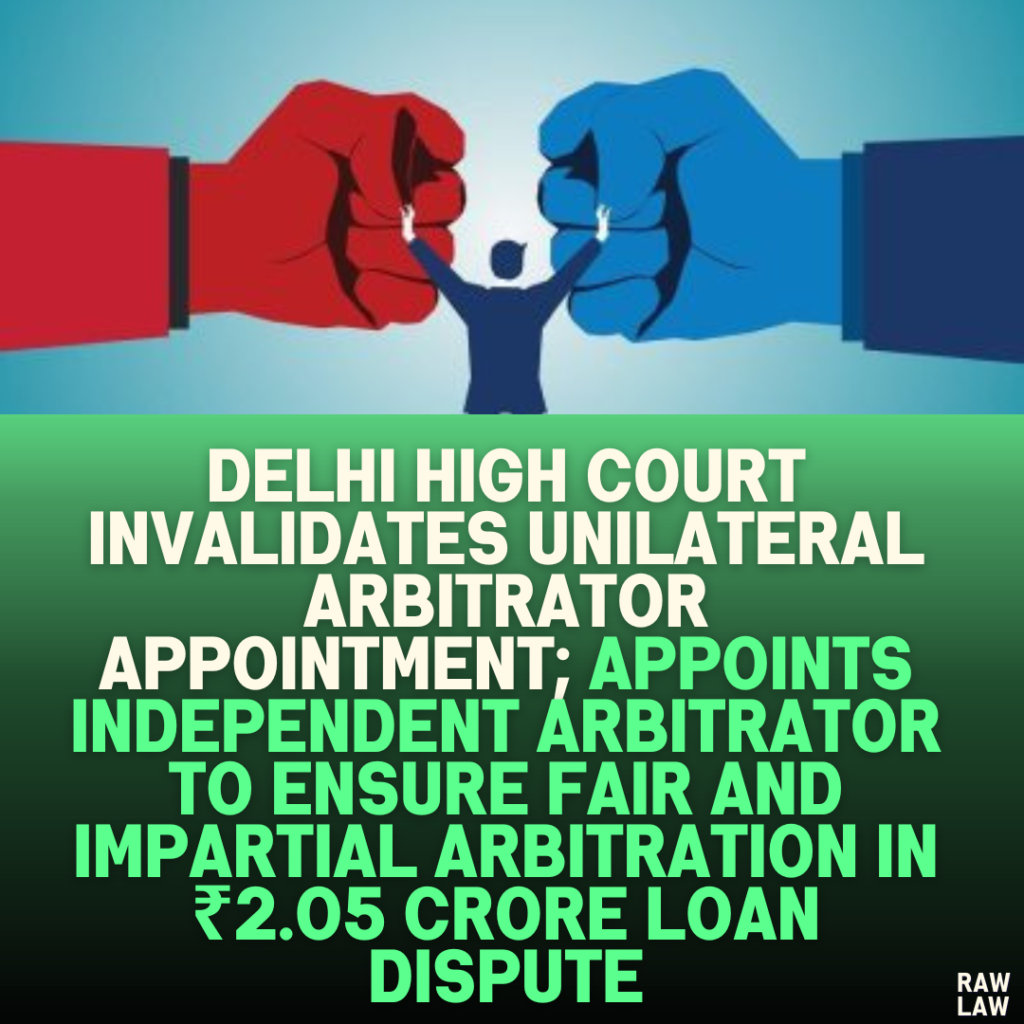Court’s Decision:
The Delhi High Court, in a petition under Section 11(6) of the Arbitration and Conciliation Act, 1996, appointed an independent sole arbitrator to resolve disputes between the petitioner and the respondents. The decision followed procedural irregularities in the respondents’ earlier unilateral arbitrator appointment. The court emphasized fairness and impartiality in arbitration proceedings while ensuring compliance with statutory requirements.
Facts of the Case:
- The petitioner, a housing finance company, lent ₹2.05 crore to the respondents through a Loan Agreement dated February 27, 2016, secured by mortgaging property in New Delhi.
- The respondents defaulted on EMI payments. Consequently:
- The petitioner issued a Section 13(2) notice under the SARFAESI Act, 2002, demanding repayment.
- The mortgaged property was auctioned for ₹16 lakh, recovering part of the outstanding debt. However, a sum of ₹1.01 crore remained unpaid as of December 22, 2020.
- Disputes persisted, and as per the arbitration clause (Article 12) in the agreement, the petitioner appointed a sole arbitrator on December 23, 2023. The clause gave the petitioner the unilateral right to appoint an arbitrator.
- The arbitrator terminated the mandate citing legal precedents that disallow unilateral appointments, leading to further procedural steps:
- A fresh arbitration demand notice dated February 2, 2024, was sent, but the respondents did not respond.
- Notices were subsequently served through substituted service, including newspaper publications in The Times of India and Jansatta on December 10, 2024.
- With no response or appearance from the respondents, the petitioner sought the High Court’s intervention under Section 11(6) of the A&C Act.
Issues Raised:
- Validity of Unilateral Arbitrator Appointment:
- Whether the petitioner’s earlier appointment of an arbitrator under Article 12 of the Loan Agreement complied with established legal principles.
- Compliance with Service Requirements:
- Whether substituted service fulfilled the statutory requirement of notice under Section 3 of the Arbitration and Conciliation Act, 1996.
Petitioner’s Arguments:
- Existence of a Valid Arbitration Clause:
- The petitioner emphasized the arbitration clause in the loan agreement, which authorized disputes to be resolved through arbitration.
- Service of Notice:
- The petitioner argued that it had fulfilled its obligation under Section 3 of the A&C Act through multiple service attempts, including substituted service by newspaper publication.
- Need for Court Intervention:
- Citing precedents, the petitioner urged the court to appoint an independent arbitrator to ensure impartial adjudication.
Respondent’s Arguments:
- The respondents failed to appear or present arguments despite being served multiple notices, including by publication.
Analysis of the Law:
- Invalidating Unilateral Arbitrator Appointments:
- The court referred to Perkins Eastman Architects DPC v. HSCC (India) Ltd and TRF Limited v. Energo Engineering Projects Ltd, which prohibit one party from having exclusive authority to appoint an arbitrator. Such appointments compromise impartiality and violate the principles of fairness.
- Service Requirements Under Section 3:
- Section 3 of the A&C Act considers a written communication as received if sent to the last known address by methods that provide a record of delivery attempts. The petitioner’s actions, including substituted service by publication, met these statutory requirements.
- Arbitration Clause Validity:
- The arbitration clause in the loan agreement was deemed valid. Disputes about its enforceability fell under the jurisdiction of the arbitral tribunal, as upheld in SBI General Insurance Co. Ltd. v. Krish Spinning.
Precedent Analysis:
The court relied on:
- Perkins Eastman Architects DPC v. HSCC (India) Ltd:
- Highlighted the necessity of an independent arbitrator where one party has control over the appointment process.
- TRF Limited v. Energo Engineering Projects Ltd:
- Established that a person disqualified from acting as an arbitrator cannot appoint an arbitrator.
- Bharat Broadband Network Ltd. v. United Telecoms Ltd:
- Reinforced impartiality requirements in arbitrator appointments.
- SBI General Insurance Co. Ltd. v. Krish Spinning:
- Mandated adherence to arbitration clauses in agreements, ensuring fair dispute resolution.
Court’s Reasoning:
- The court noted that the arbitration clause was valid and disputes fell within its scope.
- The petitioner had satisfied the statutory requirements of notice service under Section 3 of the A&C Act.
- The court held that earlier unilateral arbitrator appointments were legally untenable, necessitating an independent appointment.
Conclusion:
The court appointed Mr. Abhishek Mahajan, Advocate, as the sole arbitrator, directing him to:
- Proceed with arbitration subject to disclosure under Section 12 of the A&C Act.
- Charge fees in accordance with the Fourth Schedule of the A&C Act or as mutually agreed with the parties.
The court clarified that its decision did not prejudice the merits of the case and left all claims and counterclaims to the arbitrator’s adjudication.
Implications:
- Strengthening Arbitration Fairness:
- The judgment reiterates the judiciary’s commitment to upholding the principles of fairness and impartiality in arbitration.
- Clarity on Arbitrator Appointments:
- The decision invalidates unilateral appointments, providing clarity for similar contractual disputes.
- Encouraging Arbitration Compliance:
- This judgment underscores the importance of adhering to procedural requirements under the A&C Act, ensuring efficient dispute resolution.




Pingback: Bombay High Court: Criminal Prosecution Cannot Be Based on Vague and General Allegations in Dowry Harassment and Abetment of Suicide Cases Against Distant Relatives - Raw Law
Pingback: Bombay High Court Sets Land Compensation at ₹26,000 per Square Meter: Affirms Valuation Based on Comparable Sale Method and Excludes Post-Acquisition Costs - Raw Law